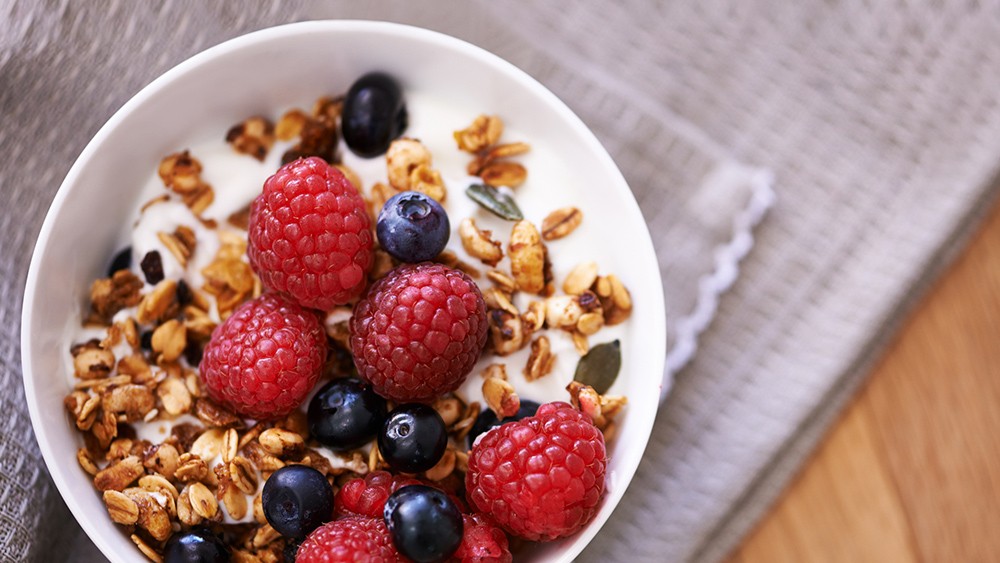10 Foods That Support the Immune System, According to a Dietitian
Last Updated on February 22, 2022
Medically Reviewed by Natalie Olsen, MS, RDN
The foods you eat have a profound impact on your body's immune system. Eating some foods can promote inflammation and weaken your immune system, whereas eating others can lower inflammation and prevent cell damage, bolstering your immune health.


A healthy immune system protects your body from harmful bacteria, viruses, and other foreign invaders that cause infection, illness, and disease.
Unfortunately, poor sleep, chronic stress, environmental pollutants like heavy metals, pesticides, and airborne pollutants can weaken your immune system, increasing your risk for illness.
While regularly exercise and getting enough sleep is key to a strong immune system, your diet also plays an integral role.
Here are 10 foods to support a healthy immune system.
1. Oats
Oats are a healthy whole-grain food, rich in many vitamins, minerals, and beneficial plant compounds.
One of these compounds is a type of fiber called beta-glucan. Beta-glucan supports a healthy gut microbiota composition, inhibits inflammatory proteins, and maintains immune homeostasis. (1)
Dietary fiber like beta-glucan also help reduce inflammation by supporting healthy blood sugar levels.
In addition to beta-glucan, oats contain other nutrients necessary for a healthy immune system, including vitamins A and C, copper, iron, selenium, and zinc.
Put It Into Action
- Stick with unflavored types of oats like quick, steel cut, and old-fashioned oats.
- Instead of using sugar, cook your oats with fresh fruit like raspberries and blueberries and top with cinnamon.
- Nuts and seeds also make good oatmeal toppings.
2. Oysters
Like clams, mussels, and scallops, oysters are a type of bivalve mollusk, meaning the interior soft-bodied muscle is surrounded by two shells.
Oysters are packed with zinc, a mineral essential for maintaining a strong immune system.
Just one oyster has almost 200% more zinc than the recommended dietary allowance. (2)
While there is no study on the effects of eating oysters for bolstering immune health, studies have shown benefits with zinc supplements.
A review of 17 studies involving more than 2,000 participants found that zinc supplementation shortened the duration of cold symptoms by nearly two days in adults compared with placebo. (3)
Including oysters in your diet is a great way to get plenty of zinc and help keep your immune system strong.
Oysters are also an excellent source of iron and copper, both of which help your body fight infections and form red blood cells.
Put It Into Action
- Look for oysters with closed and intact shells.
- The oyster muscle should be plump and solid in color. Toss it if it looks translucent or milky.
- You can also smell the oyster to ensure it’s safe to eat. It should smell slightly sweet and like the sea.
3. Salmon
Salmon is rich in the anti-inflammatory omega-3 fatty acids docosahexaenoic acid (DHA) and eicosapentaenoic acid (EPA).
One study showed that people who followed a calorie-restricted diet and ate three servings of salmon per week experienced greater reductions in markers of inflammation and oxidative stress compared to those who ate cod or supplemented with fish oil pills. (4)
Inflammation and oxidative stress weaken the immune system.
Salmon is also a great source of vitamin D, which helps enhance the function of immune cells. Just one 4-ounce serving of salmon contains 100% of the RDA of vitamin D for adults. (5)
Put It Into Action
- Health authorities recommend eating two 3-ounce servings of fish, particularly fatty fish like salmon, per week.
- Fresh and frozen varieties are best, but canned salmon is just as nutritious.
- For more flavor, add paprika, a pinch of salt and pepper, and a few drops of lemon juice before baking or pan-frying.
4. Yogurt
Yogurt is a fermented dairy product that contains probiotics, a type of “good” bacteria. These bacteria help promote a healthy gut microbiota.
The composition of your gut microbiota plays an important role in keeping you healthy.
If the microbial communities within your gut are imbalanced with more “bad” bacteria than “good” bacteria, inflammation increases and your health may decline.
As a good source of probiotics, yogurt helps promote healthy bacteria diversity and gut health. (6)
One study suggested that you need to consume at least 1,750 grams of yogurt, or about 8 cups, per week to get enough probiotics to have beneficial effects. (7)
However, even if you don’t eat yogurt very often or feel like eating that amount would be unrealistic, incorporating some yogurt into your diet can still be beneficial for your health.
Yogurt naturally contains less lactose than some other dairy products. Some people who are lactose intolerant can usually tolerate yogurt without experiencing symptoms.
Put It Into Action
- Opt for yogurt varieties that contain low or no added sugars.
- Greek varieties offer significantly more protein than their regular counterparts.
- Increase your yogurt intake by substituting sour cream, buttermilk, and cottage cheese with Greek yogurt.
5. Brazil Nuts
Brazil nuts are the edible seeds from the Brazil nut tree. They provide healthy fats and a variety of vitamins and minerals.
Brazil nuts are particularly high in selenium, a mineral that plays an important role in inflammation, thyroid health, and immunity. (8)
Selenium is also crucial for preventing an overactive immune system, which can lead to autoimmune conditions and chronic inflammation. (8, 9)
Brazil nuts are the most potent source of selenium available, containing nearly 1,000% of the RDA per ounce (6–8 nuts). (10)
Brazil nuts should be consumed in moderation as too much can lead to selenium toxicity. If you are taking a selenium supplement, limit your Brazil nuts intake even further. (11)
Put It Into Action
You can enjoy Brazil nuts raw, but roasting them can really add to the flavor:
- Line a sheet pan with them and roast at 350 degrees Fahrenheit for about five minutes.
- Season with salt, Cajun seasoning, or curry powder while they are still warm.
6. Sweet Peppers
Sweet peppers refer to peppers with a fruity or slightly-sweet flavor, like bell peppers, banana peppers, and pimentos.
While citrus fruits like oranges and grapefruits tend to be commonly known for their high vitamin C content, sweet peppers, especially the red and green varieties, include a high amount of vitamin C as well. (12)
One-half cup of red sweet peppers contains 106% of the RDA for vitamin C which is 26% more than one medium-sized orange. (12)
Vitamin C supports various cellular functions of both the innate and adaptive immune systems. (13)
The innate immune response is your body’s first line of defense against foreign invaders, and the adaptive response is your body’s second line of defense. It is a more specific response and takes over if the innate immune system is unable to destroy the germs. (14)
Put It Into Action
There are so many ways to enjoy sweet peppers:
- Chop them up and add them to a salad.
- Slice and thread on your favorite kabob for grilling.
- Cut them into slices and dip in hummus, or just eat them by themselves.
7. Sweet Potatoes
Sweet potatoes are sweet, starchy root vegetables.
Regular white and sweet potatoes are comparable in their calorie, protein, and carb content, but sweet potatoes are incredibly rich in vitamin A.
One medium-sized sweet potato provides 132% of the RDA for vitamin A. (15)
Vitamin A helps grow and maintain the epithelial tissue that lines the respiratory tract and intestines, which provides an effective frontline barrier against invaders. (16)
What’s more, vitamin A is necessary for a strong T-cell response. (16)
T cells are important white blood cells that play a central role in your body’s adaptive immune response, helping to destroy invading pathogens and any toxic products they produce.
As an added bonus, sweet potatoes are also an excellent source of vitamin C.
Put It Into Action
Roasted sweet potatoes make for a quick and easy side dish:
- Dice them, drizzle with extra-virgin olive oil, and sprinkle with salt and pepper.
- Then roast for 25 to 30 minutes at 375 degrees Fahrenheit.
8. Mushrooms
Very few foods naturally contain an appreciable amount of vitamin D, but mushrooms are an excellent source.
While classified as a vitamin, vitamin D functions more like a hormone by communicating with various organs to coordinate different functions.
One of these functions is to enhance the pathogen-defending effects of white blood cells while also preventing the immune system from becoming overactive, which can promote inflammation and disease. (17)
All mushrooms contain some vitamin D, but those that have been exposed to ultraviolet (UV) light contain significantly more.
This is because mushrooms, like humans, can produce vitamin D from sunlight or artificial UV-light exposure. (18)
A 1/2 cup of mushrooms exposed to UV light contains 9.2 mcg (366 IUs) of vitamin D. The RDA for vitamin D is 15–20 mcg (600–800 IUs) daily depending on age, and even higher if there is a deficiency. (19)
Put It Into Action
- Mushrooms are extremely versatile, whether cooked or raw, you can add them to pasta, sandwiches, salads, and soups.
- Store them unwashed in your refrigerator for no more than three days.
9. Blueberries
Blueberries are low in calories but packed with nutrients.
Blueberries are particularly rich in anthocyanins, a plant pigment that gives blueberries their dark blue and purple color.
Anthocyanins provide powerful antioxidant and anti-inflammatory effects, which help bolster the immune system. (20)
In one study, participants with metabolic syndrome who ate one cup of blueberries daily for six months experienced significant improvements in blood circulation and HDL “good” cholesterol levels. (21)
The authors of the study linked these findings to the berries’ potent antioxidant and anti-inflammatory effects, as well as a potential increase in healthy gut bacteria, which is essential for a healthy immune system.
Other studies in animals and cells have shown that blueberries enhance the function of T-cells while suppressing inflammatory pathways that can weaken the immune system. (22)
Put It Into Action
- Enjoy more blueberries by adding them to a smoothie or topping oatmeal, cottage cheese, or yogurt with them.
- Frozen blueberries tend to be just as nutritious as their fresh counterparts.
10. Spinach
Dark leafy greens like spinach are among the richest sources of folate.
Folate is a B-vitamin important for red blood cell formation and healthy cell growth and function.
In addition to these functions, folate also supports a healthy immune system.
Without enough folate, your immune system’s ability to produce enough white blood cells or produce them quickly enough to effectively fight infections decreases. (23)
About 3 cups of spinach provide nearly 30% of the RDA for folate. (24)
Put It Into Action
There are many ways to add more spinach to your diet that don’t involve salad. Try:
- Cooking it with your eggs.
- Blending it in shakes.
- Stirring into soups and stir-frys.
- Stacking on sandwiches.
Frequently Asked Questions
Can you really boost your immune system?
Scientifically, a “boost” in your body’s immune system response wouldn’t be a good thing. This would mean your immune system was overactive, which leads to autoimmune disorders.
Instead, you want to help the immune system function normally to help prevent infections.
Can you take supplements for immune health?
Many supplements like zinc, vitamin C, and vitamin D can help ensure your immune system is functioning well, but they won’t make much of a difference if you have a poor diet, are sedentary, or skimp on sleep.
What if I can’t afford to eat these foods all the time?
The unfortunate truth is that nutrient-dense foods like those on this list tend to be much more expensive than highly-processed foods like sweets, chips, and the like.
However, you can still eat healthy by buying frozen fruits and vegetables, buying certain items in bulk, buying store brands, and looking for sales.
Also, depending on what your diet currently looks like, work to eliminate or reduce highly-processed foods from your diet and replace them with healthier alternatives.
The Bottom Line
The foods you eat — and don’t eat — have a huge impact on your body’s ability to prevent and fight infections.
By incorporating more of the foods on this list in your diet, you can help keep your immune system stay strong.
Keep in mind, though, that a single food alone won’t bolster your immune health; rather, it’s the overall makeup of your diet that truly matters.
That said, incorporate more minimally processed foods and work to eliminate any highly processed foods in your diet like sugary drinks, ice cream and frozen desserts, processed meats like sausages and deli meats, and the like.
At WellnessVerge, we only use reputable sources, including peer-reviewed medical journals and well-respected academic institutions.
- The Role of Oat Nutrients in the Immune System: A Narrative Review:
https://www.ncbi.nlm.nih.gov/pmc/articles/PMC8063794/ - FoodData Central:
https://fdc.nal.usda.gov/fdc-app.html#/food-details/1099136/nutrients - Zinc for the treatment of the common cold: a systematic review and meta-analysis of randomized controlled trials:
https://www.ncbi.nlm.nih.gov/pmc/articles/PMC3394849/ - Effects of weight loss and seafood consumption on inflammation parameters in young, overweight and obese European men and women during 8 weeks of energy restriction - PubMed:
https://pubmed.ncbi.nlm.nih.gov/20551965/ - FoodData Central:
https://fdc.nal.usda.gov/fdc-app.html#/food-details/1098966/nutrients - Yogurt, cultured fermented milk, and health: a systematic review:
https://www.ncbi.nlm.nih.gov/pmc/articles/PMC8579104/ - Effects of Dietary Yogurt on the Healthy Human Gastrointestinal (GI) Microbiome:
https://www.ncbi.nlm.nih.gov/pmc/articles/PMC5374383/ - The Role of Selenium in Inflammation and Immunity: From Molecular Mechanisms to Therapeutic Opportunities:
https://www.ncbi.nlm.nih.gov/pmc/articles/PMC3277928/ - Selenium and Thyroid Disease: From Pathophysiology to Treatment:
https://www.ncbi.nlm.nih.gov/pmc/articles/PMC5307254/ - Selenium - Health Professional Fact Sheet:
https://ods.od.nih.gov/factsheets/Selenium-HealthProfessional/ - Selenium Accumulation, Speciation and Localization in Brazil Nuts (Bertholletia excelsa H.B.K.):
https://www.ncbi.nlm.nih.gov/pmc/articles/PMC6724122/ - Vitamin C - Health Professional Fact Sheet:
https://ods.od.nih.gov/factsheets/VitaminC-HealthProfessional/ - Vitamin C and Immune Function - PubMed:
https://pubmed.ncbi.nlm.nih.gov/29099763/ - The innate and adaptive immune systems - InformedHealth.org - NCBI Bookshelf:
https://www.ncbi.nlm.nih.gov/books/NBK279396/ - FoodData Central:
https://fdc.nal.usda.gov/fdc-app.html#/food-details/168484/nutrients - Role of Vitamin A in the Immune System:
https://www.ncbi.nlm.nih.gov/pmc/articles/PMC6162863/ - Vitamin D and the Immune System:
https://www.ncbi.nlm.nih.gov/pmc/articles/PMC3166406/ - A Review of Mushrooms as a Potential Source of Dietary Vitamin D:
https://www.ncbi.nlm.nih.gov/pmc/articles/PMC6213178/ - Vitamin D - Health Professional Fact Sheet:
https://ods.od.nih.gov/factsheets/VitaminD-HealthProfessional/ - Anthocyanins: Promising Natural Products with Diverse Pharmacological Activities:
https://www.ncbi.nlm.nih.gov/pmc/articles/PMC8270296/ - Blueberries improve biomarkers of cardiometabolic function in participants with metabolic syndrome-results from a 6-month, double-blind, randomized controlled trial - PubMed:
https://pubmed.ncbi.nlm.nih.gov/31136659/ - Molecular Mechanism and Health Role of Functional Ingredients in Blueberry for Chronic Disease in Human Beings:
https://www.ncbi.nlm.nih.gov/pmc/articles/PMC6164568/ - Folate deficiency inhibits the proliferation of primary human CD8+ T lymphocytes in vitro - PubMed:
https://pubmed.ncbi.nlm.nih.gov/15322179/ - FoodData Central:
https://fdc.nal.usda.gov/fdc-app.html#/food-details/1999632/nutrients






